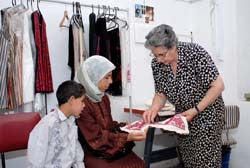Bethlehem Arab Women's Union
 Location: Bethlehem, West Bank
Location: Bethlehem, West Bank
Beneficiaries: 150 women from villages and refugee camps around Bethlehem

The Bethlehem Arab Women’s Union (BAWU) has a long history of community service, dating back to 1947 when it was founded as a first aid centre to care for refugees from the first Arab-Israeli war. Among the BAWU’s many activities are organising luncheons for senior citizens, activities for youth, and women’s income-generation projects through food and craft production.
The BAWU embroidery project was established in 1968 in response to worsening living conditions following the Israeli military occupation in 1967. The Union prides itself by producing meticulous needle work that features traditional Bethlehem motifs, including stars and vines, keeping the Bethlehem heritage alive. Today, more than 150 women from nearby villages and refugee camps receive embroidery work at the Women’s Union.
View our product range from the Bethlehem Arab Women's Union here >>

Cross-stitch embroidery in Palestine
Once a traditional craft practiced by village women, Palestinian cross-stitch embroidery has become an important symbol of Palestinian culture. Embroidered pieces can be found in the homes of most Palestinian families in the West Bank, Gaza Strip, Israel and the Diaspora beyond, adorning the walls of houses in Jerusalem, villas in the Gulf, suburban homes in the United States, and cement block houses in refugee camps. In addition, cross-stitch embroidery is given as gifts and worn by Palestinians worldwide on festive occasions.
The popularity of embroidery springs from both its beauty and its association with the Palestine of the past. Common patterns reflect the millennia-long history of the land. The designs are derived from sources as diverse as ancient mythology and foreign occupations and date as far back as the Canaanites, who lived in the area over three thousand years ago.
The handicraft also symbolises the traditional rural lifestyle of Palestine, much of which was lost after the 1948 creation of the state of Israel. Embroidery was the principal decoration of rural women's clothing. It was part of a village women's daily routine and a means of showing off her personal skills and social identity. The patterns, colours and quality of the dress reflected a woman's social standing, marital status and wealth.
Although the Palestinian cultural landscape has changed dramatically in the last fifty years, cross-stitch embroidery has remained a vibrant handicraft because, for many Palestinians, it is a familiar reminder of Palestine in the days of their grandparents or great-grandparents.
